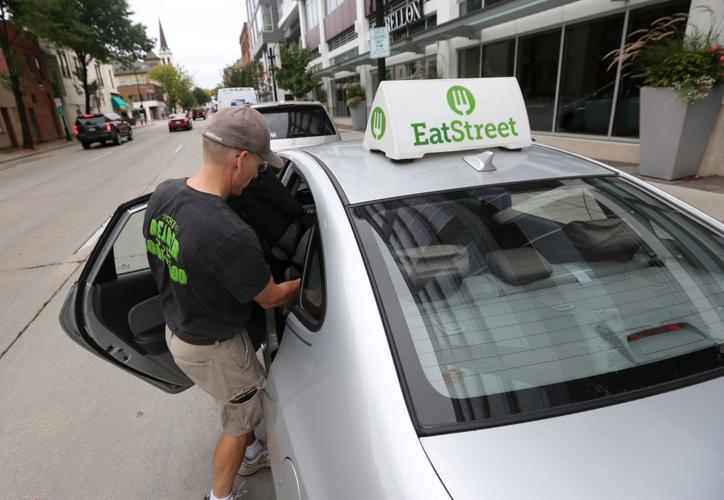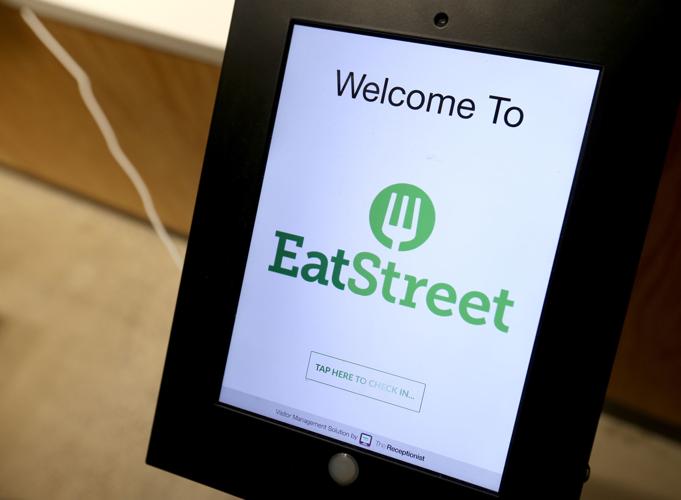Online food-ordering company EatStreet, founded and headquartered in Madison and long considered one of the city’s most successful startups, is replacing its staff drivers with third-party contractors, the company announced this week.
The move comes a little more than two weeks after a federal judge signed off on an agreement obligating the privately held company to pay a total of $1.24 million to hundreds of former drivers and their attorneys to settle a class-action lawsuit alleging federal and state labor law violations.
“While we have historically operated with W-2 employed drivers, we have found it difficult to maintain this model in the highly competitive food delivery business,” the company said in a statement Thursday. Switching to third-party delivery services “puts us in a better position to compete in the future and allows us to offer expanded delivery hours and broader coverage for our restaurant partners.”
People are also reading…
- World Naked Bike Ride returns to Capitol Square
- Missing Reedsburg boy believed to be alive, trying to live 'off the grid'
- SOS: Elderly couple escapes Illinois, but not AT&T
- Verona School Board votes against firing administrator who struck student
- Update: Man dies after shooting Downtown early Sunday, Madison police say
- Local standout decommits from Wisconsin football program
- OUR VIEW: Madison needs more housing projects like this
- Madison City Council refuses rezoning for big student housing project Downtown
- Second player decommits from Wisconsin football, flips to Big Ten rival
- Vernon County deputy fatally shoots driver dragging deputy from traffic stop, authorities say
- American Girl doll sale is ending after raising $25 million for nonprofits
- New restaurant going into former HotelRed on corner of Monroe and Regent streets
- UW Choral Union ends after 130-year run
- Texas QB with familiar last name becomes Wisconsin football's first class of 2025 commit
- Wisconsin Supreme Court justice Brian Hagedorn accuses Rebecca Bradley of 'knives-out bluster' in ruling
EatStreet says it currently works with more than 5,000 restaurants in more than 250 cities nationwide.
Drivers will be out of work as of Aug. 21, Pete Hessell, EatStreet director of driver management, said in a Wednesday email to Madison drivers that was shared with the Wisconsin State Journal. A company spokesperson declined to say how many drivers will lose their jobs companywide, but a filing with the state Department of Workforce Development’s Dislocated Worker Unit identifies 26 affected employees in Madison.
Hessell’s email makes no mention of any severance packages but says the company will not challenge driver applications for unemployment. Drivers will not have “bumping rights,” or the ability to take the jobs of less-senior employees, the email said.
“On behalf of the EatStreet team, I sincerely apologize for this change and thank you for your contribution to EatStreet,” Hessell said in the email. “We wish you nothing but the best moving forward.”
Paul Howell, of New Glarus, said he started driving for EatStreet just after the COVID-19 pandemic started and “really liked it a lot.” He also lauded the company’s health insurance benefits and 401(k) match.
“To me, they were doing the right thing,” said Howell, 63. “That is the biggest letdown, knowing it’s going to end, is that I will lose my health insurance.”
He said he made nearly 11,000 deliveries for EatStreet in the past three years, and was making about $23 an hour during the pandemic and about $21 to $22 an hour now.
Wage theft suit
The company’s legal problems date to 2020, when Kristoffer Martin, a former EatStreet delivery driver, and two other drivers, sued in federal court over alleged wage theft.
The drivers contended that EatStreet violated the Fair Labor Standards Act and Wisconsin wage law when it “failed to reimburse delivery drivers for vehicle and mileage expenses and when it used drivers’ tips to meet minimum wage requirements.”
By August, EatStreet had agreed to pay $1.24 million, including $413,333 in attorney fees. Drivers are eligible for a piece of the settlement if they worked for company between late March 2017 and mid-June of 2021 and had not signed an arbitration agreement with EatStreet.
But in December, EatStreet told the court it might not be able to make those payments because “over the last three months, EatStreet’s financial circumstances have deteriorated rapidly due to multiple factors.”
Among them, the company’s main creditor was saying it had defaulted on a loan.
In October, EatStreet shut down HungerHub, a commercial kitchen and grocery concept it started in late 2021 with three Madison hubs: Forkful Market by EatStreet on State Street, and hubs on the East and West sides.
HungerHub had to lay off a number of employees, given its continued inability to generate a profit, court documents say.
EatStreet in April 2020 got $3.61 million in federal COVID relief to pay staff wages, according to a database of loans kept by investigative news nonprofit ProPublica.
Humble origins
Matt Howard and Alex Wyler founded EatStreet in 2010 in a dorm at UW-Madison, and it has become one of the largest online and mobile food ordering and delivery services in the United States.
Howard left the company late last year, while Wyler left in 2019, Howard said in a brief text exchange Thursday in which he referred other questions to EatStreet’s public relations department.
In late 2017, Howard and Wyler were named to Forbes’ 2018 “30 Under 30” list, which recognizes high-achieving young entrepreneurs and philanthropists.
Photos: EatStreet
EatStreet at 316 W. Washington Ave. in Madison, on Tuesday, September 18, 2018.
EatStreet says it currently works with more than 5,000 restaurants in more than 250 cities nationwide.
The business news you need
Get the latest local business news delivered FREE to your inbox weekly.
Chris Rickert | Wisconsin State Journal
Get email notifications on {{subject}} daily!
{{description}}
Email notifications are only sent once a day, and only if there are new matching items.










